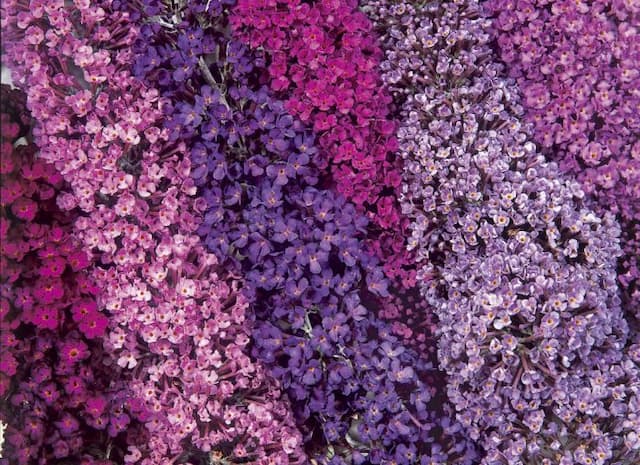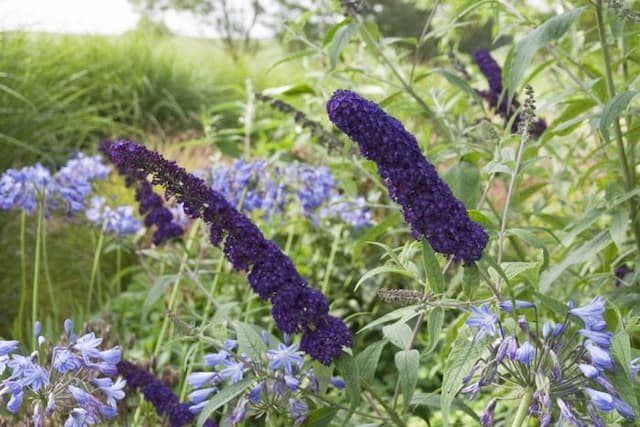Verbascum 'Apricot Sunset'

ABOUT
Verbascum 'Apricot Sunset', commonly known as Mullein, is a perennial plant that is recognized for its striking floral display. This cultivar features a rosette of soft, fuzzy leaves that are silver-green in color and provide a textural contrast in the garden. From the center of this foliage, sturdy flower spikes emerge, boasting a cascade of delicately arranged blossoms. The flowers themselves have a distinctive cup shape and come in a warm, apricot-orange hue that fades to a softer yellow toward the center. The blooms may have subtle purple stamens that add to the beauty of the display. Mullein blooms generously, with the flowers densely packed along the stem, creating a bold and beautiful vertical element in the landscape. These blooms are also favored by pollinators such as bees and butterflies, making the plant not only a visual delight but also a beneficial addition to any garden focused on supporting beneficial insects.
About this plant
 Names
NamesSynonyms
Mullein, Velvet Plant
Common names
Verbascum 'Apricot Sunset'
 Toxicity
ToxicityTo humans
Mullien 'Apricot Sunset' is not commonly known to be toxic to humans. While it generally does not contain toxic compounds that would lead to serious poisoning, it's always prudent to avoid ingesting plants not specifically grown for consumption, as they could cause mild stomach upset or allergic reactions in sensitive individuals.
To pets
Mullien 'Apricot Sunset' is not commonly known to be toxic to pets such as cats and dogs. It's not listed among the toxic plants for pets; thus, it's unlikely to cause serious harm if small amounts are ingested. However, ingestion of non-food plants can sometimes cause mild gastrointestinal upset in pets, such as vomiting or diarrhea. If a pet consumes a large amount of the plant or appears to be in distress, it is always best to consult with a veterinarian.
 Characteristics
CharacteristicsLife cycle
Biennials
Foliage type
Deciduous
Color of leaves
Green
Flower color
Apricot
Height
3 feet (91 cm)
Spread
1 foot (30 cm)
Plant type
Herb
Hardiness zones
5
Native area
Europe
Benefits
 General Benefits
General Benefits- Attracts pollinators: Provides nectar and pollen for bees, butterflies, and other beneficial insects.
- Drought tolerance: Once established, it can withstand periods of low water, making it suitable for xeriscaping.
- Low maintenance: Requires minimal care, making it an ideal plant for gardeners with limited time.
- Long blooming period: Flowers from early summer to fall, providing extended visual interest.
- Deer resistant: Less likely to be eaten by deer, which can be beneficial in areas where deer predation is a problem.
- Easy to grow: Adapts well to a variety of soil types and environmental conditions.
- Height interest: Adds vertical dimension to a garden due to its tall flowering spikes.
- Colorful blooms: Produces apricot to pink-colored flowers that can brighten up a garden space.
- Self-seeding: Can propagate itself by dropping seeds, leading to new plants in subsequent years without additional planting.
 Medical Properties
Medical PropertiesThis plant is not used for medical purposes.
 Air-purifying Qualities
Air-purifying QualitiesThis plant is not specifically known for air purifying qualities.
 Other Uses
Other Uses- Mulch Production: The large, velvety leaves of the Verbascum 'Apricot Sunset' can be dried and used as a mulching material to suppress weeds and retain soil moisture.
- Natural Dyes: The flowers and leaves can be used to create natural dyes for textiles, yielding colors that range from green to brown.
- Companion Planting: This plant can be used in gardens to attract beneficial insects such as pollinators, which help to increase the productivity of vegetable and fruit crops.
- Candle Making: Historically, the tall, sturdy stalks of the Verbascum species were dipped in fat or wax to create torches or candles.
- Photography Prop: With its striking flowers and height, it can serve as an excellent backdrop or focal point in garden photography.
- Floral Arrangements: The flowers and seed pods add unique texture and interest to dried floral arrangements.
- Plant Stakes: Once dried, the rigid stalks of the plant can be repurposed as natural stakes for supporting other plants in the garden.
- Fire Starter: The dry, fluffy seed of Verbascum can be used as a fire starting material in outdoor survival situations.
- Art Supplies: Both leaves and flowers can be used to create botanical prints or as stamps for natural art projects.
- Fish Compost: In the past, certain Verbascum species have been used to make a compost that is particularly beneficial for enriching soil that will be used to grow fish-friendly aquatic plants.
Interesting Facts
 Feng Shui
Feng ShuiThe Mullein is not used in Feng Shui practice.
 Zodiac Sign Compitability
Zodiac Sign CompitabilityThe Mullein is not used in astrology practice.
 Plant Symbolism
Plant Symbolism- Healing: Commonly known as Mullein, Verbascum has historical use in traditional medicine, symbolizing its ability to heal ailments, especially respiratory ones.
- Protection: Mullein has been used to ward off evil spirits and bad luck in folklore, representing protection and safety.
- Love: The soft texture and warm color of 'Apricot Sunset' can be symbolic of gentleness in love and relationships.
- Courage: Historically, Mullein was believed to instill courage and fearlessness in individuals, especially during challenging times.
- Health: The plant's historical use as a remedy for various conditions makes it a symbol of good health and vitality.
 Water
WaterThe common Mullein, including the variety 'Apricot Sunset,' should be watered deeply but infrequently, as it is a drought-tolerant plant. The top inch of soil should be allowed to dry out between waterings. During the growing season, watering might be required every 1 to 2 weeks depending on local weather conditions. Each watering session should provide enough water to saturate the root zone. For a newly planted Mullein, consider using about 1 gallon of water per plant, gradually reducing frequency as the plant becomes established.
 Light
LightMullein thrives in full sun conditions, receiving at least 6 to 8 hours of direct sunlight per day. It's ideal to place Verbascum 'Apricot Sunset' in a spot where it can enjoy the bright, unfiltered light of the sun for most of the day. The plant is well-suited for sunny borders or open landscapes where it receives ample sunlight.
 Temperature
TemperatureCommon Mullein, like 'Apricot Sunset,' performs well in a wide range of temperatures and is hardy in USDA zones 5 through 9. It can withstand temperatures as low as -20 degrees Fahrenheit and can tolerate the summer heat well. The optimal growing temperatures for Mullein are between 60 to 80 degrees Fahrenheit, but it is quite adaptable to cooler and warmer temperatures within its hardiness range.
 Pruning
PruningMullein 'Apricot Sunset' benefits from deadheading to promote continuous blooming and discourage self-seeding. Pruning should be done by removing spent flower spikes after the blossoms fade. The best time for more extensive pruning is in late winter or early spring, when removing old, dead foliage can rejuvenate the plant. Regularly removing damaged or diseased leaves is also advisable to maintain plant health.
 Cleaning
CleaningAs needed
 Soil
SoilMullein 'Apricot Sunset' thrives best in well-draining soil with good aeration; a mix of loam, compost, and sandy soil is ideal. The pH should be slightly acidic to neutral, ranging from 6.0 to 7.0 for optimal growth.
 Repotting
RepottingMullein 'Apricot Sunset' has a long taproot and prefers not to be disturbed, so repotting should be done infrequently, approximately every 2-3 years or when pot-bound.
 Humidity & Misting
Humidity & MistingMullein 'Apricot Sunset' is tolerant of a range of humidity conditions and does well in typical outdoor environments; it does not require high humidity levels to thrive.
 Suitable locations
Suitable locationsIndoor
Place in bright light and well-draining soil.
Outdoor
Full sun, well-drained soil, protect from wet winters.
Hardiness zone
5-9 USDA
 Life cycle
Life cycleThe common name for Verbascum 'Apricot Sunset' is Mullein. The life cycle begins with seed germination, occurring in spring when soil temperatures are warm enough to trigger the growth of the seedlings. As the plant emerges, it enters the vegetative stage, where it develops a basal rosette of fuzzy, silver-green leaves. In its second year, the Mullein produces a tall flower spike during the summer months; this spike is adorned with apricot-colored flowers that open sequentially and are attractive to bees and butterflies. After pollination, the flowers develop into seed capsules that eventually release seeds into the soil to complete the life cycle. The plant is biennial, meaning its life cycle spans two years before it typically dies, relying on its seeds to perpetuate the species.
 Propogation
PropogationPropogation time
Spring to Summer
Verbascum 'Apricot Sunset', commonly known as Mullein, is typically propagated by seed. The ideal time for sowing seeds is in late winter to early spring, depending on your climate zone, as they require a period of cold to break dormancy. To propagate Mullein by seeds, scatter the seeds thinly on the surface of a well-drained seed starting mix and gently press them into the soil, as they need light to germinate. Maintain a consistent level of moisture but not waterlogged conditions, and provide a stable temperature around 65°F (18°C). Germination usually takes between 14 to 30 days. Once seedlings are large enough to handle, they can be transplanted outdoors after the last frost has passed, spacing them about 12 inches (30 cm) apart to allow for full growth.


![Butterfly bush [Adonis Blue]](/_next/image?url=https%3A%2F%2Fplants-admin.emdemapps.com%2Fimages%2Fplants%2F%2Fimages%2F604b56e58f983.png&w=640&q=75)


![Butterfly bush [Buzz Ivory]](/_next/image?url=https%3A%2F%2Fplants-admin.emdemapps.com%2Fimages%2Fplants%2F%2Fimages%2F604b57987dfa8.png&w=640&q=75)
![Butterfly bush [Camberwell Beauty]](/_next/image?url=https%3A%2F%2Fplants-admin.emdemapps.com%2Fimages%2Fplants%2F%2Fimages%2F604b5ead04c12.png&w=640&q=75)


